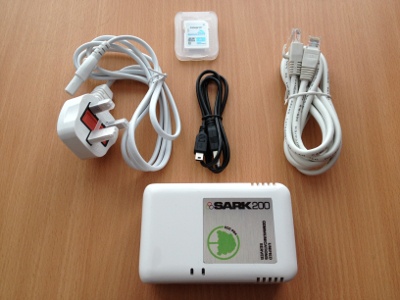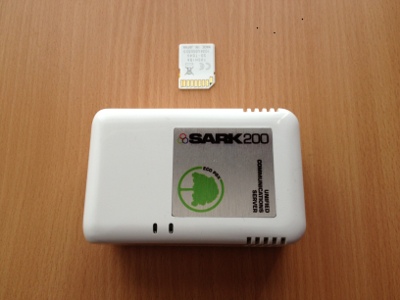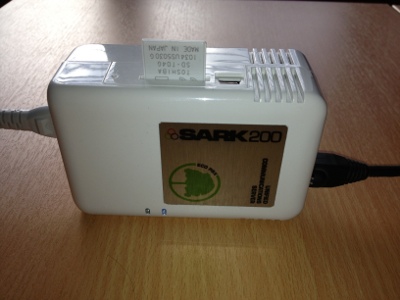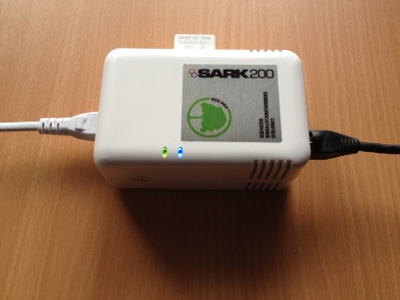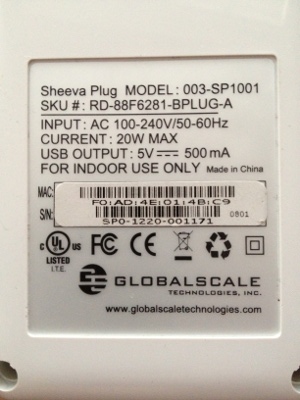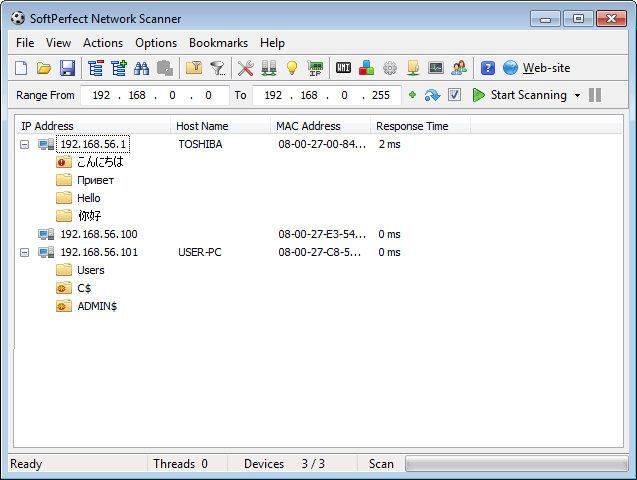Quickstart Guide
Contents
Quickstart
What's in the box?
The unit is delivered with the following (see photo):-
- "figure eight" power cord
- Engineer's (black) serial USB2 to MiniUSB lead
- Cat 5 patch lead
- 4GB SD flash memory card
Pre Power-up
The unit requires that the SD card be inserted prior to power up. The SD card is inserted into the SD card slot. The slot is located on the left face of the device bwteen the MiniUSB port and the reset pin-hole. The card should be oriented face down (as shown in the picture below).
Image showing SD Card ready to be inserted
Once inserted, the device should look like the picture below. In this image you can see the SD Card correctly inserted with the MiniUSB port to the right and (somewhat less clearly), the reset pin-hole to the left.
Image showing SD Card inserted
Power Up
You can now attach the device to the local network using the RJ45 patch cable provided or any regular RJ45 ethernet patch lead. Insert the figure eight power cord into the base of the unit and plug it into the mains (100-240VAC). The unit will power up and come on-line in about 1 minute.
Image showing the unit powered up (power lights on)
Determining the IP address
By default, the S200 ships with DHCP enabled (your reseller or distributor may off a service to preset your device with a static IP address before shipment). However, under normal circumstances, the appliance will attempt to get an IP address from the local DHCP server on your network. Of course, this does mean that you will have to figure out the IP address of the unit before you can log into it. You can do this in one of several ways and we'll describe three below. You will need the MAC address of your S200. It is printed on the reverse of the appliance.
Image showing MAC
In the above image the MAC address is the long number under the top bar code. For the device in the photo it is F0:AD:4E:01:4B:C9. The MAC address is unique to the device and you can use it to discover the IP address of your appliance. You can use any of the following methods;-
- Most commercial routers have a window which shows DHCP leases together with the corresponding IP and MAC addresses. Using this as a cross reference you can find your S200 appliance.
- If you have a windows PC or laptop you can use a free tool like softperfect's network scanner (http://www.softperfect.com/products/networkscanner/). These tools will scan your local network and return a list of each IP address on the network together with its corresponding MAC address.
- If you have a linux box then you can use arp and ping to find the S200's IP
Router DHCP Lease table example from Linksys
Here is an example of a DHCP lease table from a Linksys/Cisco router/gateway

SoftPerfect Network scanner
The scanner is free to download. You can run it and set it up by telling it where your local network addresses start and end. It will then mao your local network returning MAC addresses and IP addresses for each on-line device. In the example below the tool has scanned a class C network 192.168.0.0/24 and returned what it has discovered.
ARP/PING (Linux)
- reboot your S200 appliance and give it a minute to come up
- at your linux box run arp to show the devices in the arp table
arp Address HWtype HWaddress Flags Mask Iface pc-00102.aelintra.local ether F0:AD:4E:01:4B:C9 C eth0 pc-00038.aelintra.local ether 00:0C:29:D1:EC:1F C eth0 pc-00115.aelintra.local ether 00:0C:29:9D:32:79 C eth0 pc-00039.aelintra.local ether 00:0C:29:12:57:79 C eth0 pc-00238.aelintra.local ether 00:0C:29:B0:82:68 C eth0 pc-00116.aelintra.local ether 00:0C:29:A5:6E:05 C eth0 pc-00228.aelintra.local ether 00:0C:29:3D:AC:67 C eth0 pc-00107.aelintra.local ether 00:0E:A6:1B:BB:17 C eth0 pc-00001.aelintra.local ether 00:0F:66:D9:74:CD C eth0
As you can see, our appliance (F0:AD:4E:01:4B:C9) is first in the list. We can ping its name to get the IP
ping pc-00102.aelintra.local PING pc-00102.aelintra.local (192.168.1.102)
